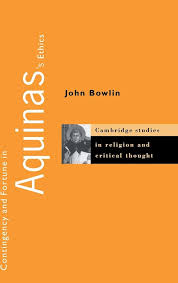
In this study John Bowlin argues that Aquinas's moral theology receives much of its character and content from an assumption about our common lot: the good we desire is difficult to know and to will, in particular because of contingencies of various kinds - within ourselves, in the ends and objects we pursue, and in the circumstances of choice. Since contingencies are fortune's effects, Aquinas insists that it is fortune that makes good choice difficult. Bowlin then explicates Aquinas's treatment of a number of topics in light of this difficulty: the moral and theological virtues, the first precepts of the natural law, the voluntariness of virtuous action, and the happiness available to us in this life. By noting that Aquinas proceeds with an eye on fortune's threats to virtue, agency, and happiness, Bowlin places him more precisely in the history of ethics, among Aristotle, Augustine, and the Stoics.



